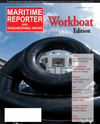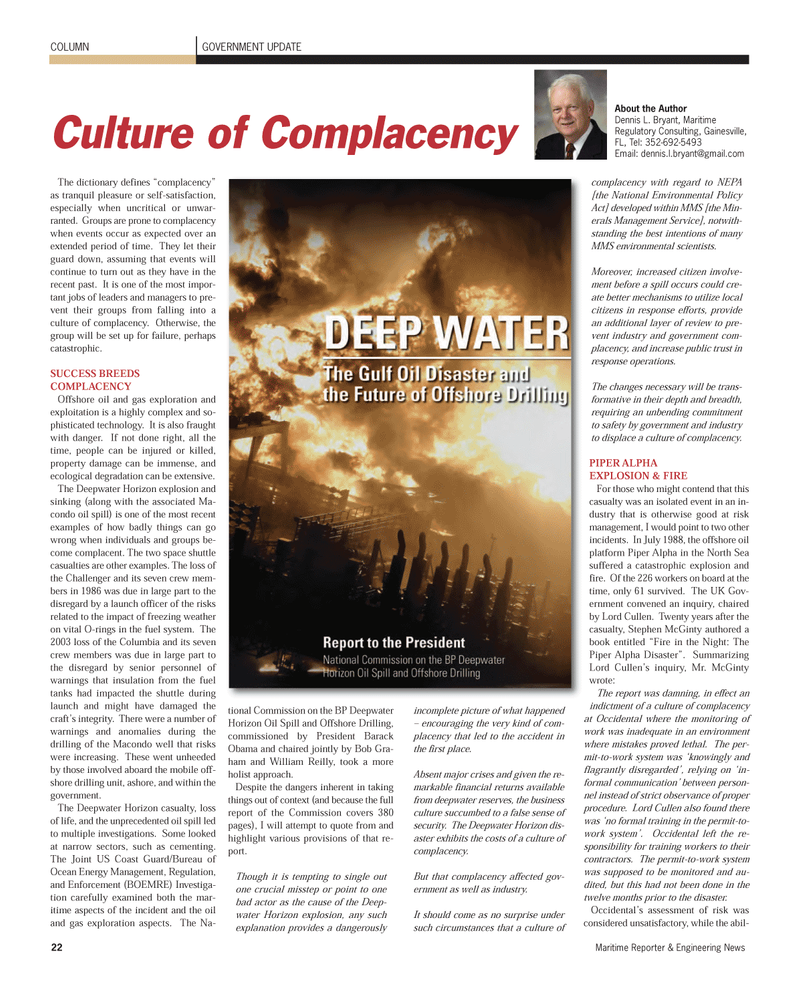
Page 22: of Maritime Reporter Magazine (November 2011)
Feature: Workboat Annual
Read this page in Pdf, Flash or Html5 edition of November 2011 Maritime Reporter Magazine
22Maritime Reporter & Engineering News The dictionary defines ?complacency? as tranquil pleasure or self-satisfaction, especially when uncritical or unwar- ranted. Groups are prone to complacency when events occur as expected over an extended period of time. They let their guard down, assuming that events will continue to turn out as they have in the recent past. It is one of the most impor- tant jobs of leaders and managers to pre-vent their groups from falling into a culture of complacency. Otherwise, the group will be set up for failure, perhaps catastrophic.SUCCESS BREEDS COMPLACENCYOffshore oil and gas exploration and exploitation is a highly complex and so- phisticated technology. It is also fraught with danger. If not done right, all the time, people can be injured or killed,property damage can be immense, andecological degradation can be extensive. The Deepwater Horizon explosion and sinking (along with the associated Ma-condo oil spill) is one of the most recentexamples of how badly things can go wrong when individuals and groups be- come complacent. The two space shuttle casualties are other examples. The loss of the Challenger and its seven crew mem- bers in 1986 was due in large part to the disregard by a launch officer of the risks related to the impact of freezing weatheron vital O-rings in the fuel system. The 2003 loss of the Columbia and its seven crew members was due in large part to the disregard by senior personnel of warnings that insulation from the fuel tanks had impacted the shuttle duringlaunch and might have damaged the craft?s integrity. There were a number of warnings and anomalies during the drilling of the Macondo well that riskswere increasing. These went unheeded by those involved aboard the mobile off- shore drilling unit, ashore, and within thegovernment. The Deepwater Horizon casualty, loss of life, and the unprecedented oil spill ledto multiple investigations. Some looked at narrow sectors, such as cementing. The Joint US Coast Guard/Bureau ofOcean Energy Management, Regulation, and Enforcement (BOEMRE) Investiga- tion carefully examined both the mar- itime aspects of the incident and the oiland gas exploration aspects. The Na- tional Commission on the BP Deepwater Horizon Oil Spill and Offshore Drilling, commissioned by President BarackObama and chaired jointly by Bob Gra-ham and William Reilly, took a more holist approach.Despite the dangers inherent in takingthings out of context (and because the full report of the Commission covers 380 pages), I will attempt to quote from andhighlight various provisions of that re- port. Though it is tempting to single outone crucial misstep or point to onebad actor as the cause of the Deep-water Horizon explosion, any such explanation provides a dangerously incomplete picture of what happened ? encouraging the very kind of com- placency that led to the accident inthe first place. Absent major crises and given the re- markable financial returns available from deepwater reserves, the business culture succumbed to a false sense of security. The Deepwater Horizon dis- aster exhibits the costs of a culture of complacency. But that complacency affected gov- ernment as well as industry. It should come as no surprise undersuch circumstances that a culture of complacency with regard to NEPA [the National Environmental Policy Act] developed within MMS [the Min- erals Management Service], notwith- standing the best intentions of manyMMS environmental scientists. Moreover, increased citizen involve- ment before a spill occurs could cre- ate better mechanisms to utilize local citizens in response efforts, provide an additional layer of review to pre- vent industry and government com- placency, and increase public trust in response operations. The changes necessary will be trans- formative in their depth and breadth, requiring an unbending commitment to safety by government and industry to displace a culture of complacency. PIPER ALPHA EXPLOSION & FIREFor those who might contend that this casualty was an isolated event in an in- dustry that is otherwise good at riskmanagement, I would point to two other incidents. In July 1988, the offshore oil platform Piper Alpha in the North Sea suffered a catastrophic explosion and fire. Of the 226 workers on board at the time, only 61 survived. The UK Gov- ernment convened an inquiry, chaired by Lord Cullen. Twenty years after the casualty, Stephen McGinty authored a book entitled ?Fire in the Night: The Piper Alpha Disaster?. Summarizing Lord Cullen?s inquiry, Mr. McGinty wrote:The report was damning, in effect an indictment of a culture of complacency at Occidental where the monitoring of work was inadequate in an environment where mistakes proved lethal. The per- mit-to-work system was ?knowingly andflagrantly disregarded?, relying on ?in- formal communication? between person- nel instead of strict observance of proper procedure. Lord Cullen also found there was ?no formal training in the permit-to- work system?. Occidental left the re- sponsibility for training workers to their contractors. The permit-to-work system was supposed to be monitored and au- dited, but this had not been done in the twelve months prior to the disaster. Occidental?s assessment of risk was considered unsatisfactory, while the abil- GOVERNMENT UPDATE COLUMNCulture of Complacency About the AuthorDennis L. Bryant, Maritime Regulatory Consulting, Gainesville,FL, Tel: 352-692-5493 Email: [email protected] Nov.11 # 3 (18-24):MR Template 10/27/2011 9:08 AM Page 22

 21
21

 23
23
